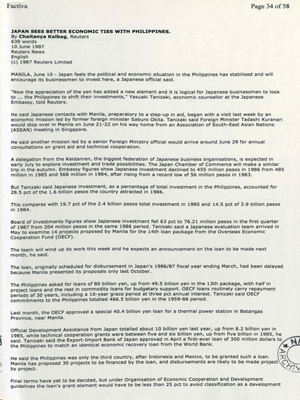JAPAN SEES BETTER ECONOMIC TIES WITH PHILIPPINES
[Reuters]
Published date: 10th Jun 1987
10 June 1987
Reuters News
English
(c) 1987 Reuters Limited
MANILA, June 10 – Japan feels the political and economic situation in the Philippines has stabilised and will encourage its businessmen to Invest here, a Japanese official said.
“Now the appreciation of the yen has added a new element and it is logical for Japanese businessmen to look to … the Philippines to shift their investments,” Yasuaki Tanizaki, economic counsellor at the Japanese Embassy, told Reuters.
He said Japanese contacts with Manila, preparatory to a step-up in ald, began with a visit last week by an economic mission led by former foreign minister Saburo Okita. Tanizaki said Foreign Minister Tadashi Kuranari would stop over in Manila on June 21-22 on his way home from an Association of South-East Asian Nations (ASEAN) meeting in Singapore.
He said another mission led by a senior Foreign Ministry official would arrive around June 29 for annual consultations on grant aid and technical cooperation.
A delegation from the Keidanren, the biggest federation of Japanese business organisations, is expected in early July to explore investment and trade possibilities. The Japan Chamber of Commerce will make a similar trip in the autumn. Embassy figures show Japanese Investment declined to 455 million pesos in 1986 from 485 million in 1985 and 568 million in 1984, after rising from a record low of 56 million pesos in 1983.
But Tanizaki said Japanese investment, as a percentage of total investment in the Philippines, accounted for 28.5 pct of the 1.6 billion pesos the country attracted in 1986.
This compares with 19.7 pct of the 2.4 billion pesos total investment in 1985 and 14.5 pct of 3.9 billion pesos in 1984.
Board of Investments figures show Japanese investment fell 63 pct to 76.21 million pesos in the first quarter of 1987 from 204 million pesos in the same 1986 period. Tanizaki said a Japanese evaluation team arrived in May to examine 14 projects proposed by Manila for the 14th loan package from the Overseas Economic Cooperation Fund (OECF).
The team will wind up its work this week and he expects an announcement on the loan to be made next month, he said.
The loan, originally scheduled for disbursement in Japan’s 1986/87 fiscal year ending March, had been delayed because Manila presented its proposals only last October.
The Philippines asked for loans of 80 billion yen, up from 49.5 billion yen in the 13th package, with half in project loans and the rest in commodity loans for budgetary support. OECF loans routinely carry repayment periods of 30 years, including a 10-year grace period at three pct annual Interest. Tanizaki sald OECF commitments to the Philippines totalled 466.5 billion yen in the 1959-86 period.
Last month, the OECF approved a special 40.4 billion yen loan for a thermal power station in Batangas Province, near Manila.
Official Development Assistance from Japan totalled about 10 billion yen last year, up from 8.2 billion yen in 1985, while technical cooperation grants were between five and six billion yen, up from five billion in 1985, he said. Tanizaki said the Export-Import Bank of Japan approved in April a first-ever loan of 300 million dollars to the Philippines to match an identical economic recovery loan from the World Bank.
He said the Philippines was only the third country, after Indonesia and Mexico, to be granted such a loan.
Manila has proposed 30 projects to be financed by the loan, and disbursements are likely to be made project by project.
Final terms have yet to be decided, but under Organisation of Economic Cooperation and Development guidelines the loan’s grant element would have to be less than 25 pct to avoid classification as a development assistance package, he said.






